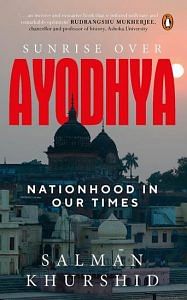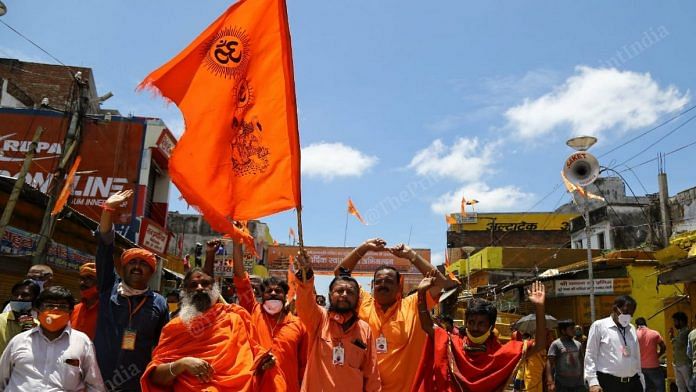The capturing of power at the Centre by the BJP and its allies in 2014, and then its further consolidation in 2019, has emboldened the right wing to speak out against what they describe as their centuries-long subjugation and to speak for the inevitable journey of this nation towards becoming a Hindu Rashtra. There is still lip service being paid to secularism, as it remains a prominent idea in the Preamble to the Constitution, but theirs is an assertive definition of secularism that describes all that the Right believes to be the true vision of Bharat or India.
As talk of Hindu Rashtra becomes more and more common, though without any official endorsement or indication of its contours, support for it, surprisingly, comes from unexpected quarters. For example, from Professor Faizan Mustafa.
Prof. Mustafa has an impressive academic record and the unique capacity to respond within hours, if not minutes, on any legal development, including Supreme Court judgments running into hundreds of pages. As head of the National Academy of Legal Studies and Research, Hyderabad (NALSAR) and former registrar of Aligarh Muslim University, Prof. Mustafa has, at a relatively young age, carved out a place for himself among constitutional lawyers. His contributions to debates on Triple Talaq and CAA–NPR–NRC have been salutary and rewarding. Yet his recent proposition is that many of our current political difficulties might be resolved if we opted to become a Hindu Rashtra. Curiously, he goes on to suggest that all it would take is a fifteen-judge constitutional bench of the Supreme Court to overrule the Kesavananda Bharti case and the doctrine of basic structure, so that Parliament could amend/omit one of the fundamental values of our Constitution— secularism. That, unfortunately, is an incorrect understanding of that judgment, but that is for another day.
What is interesting is that Prof. Mustafa believes that a Hindu Rashtra would recognize Hinduism to be the dominant religion (presumably he means de jure because de facto it already is), but people of other religions will have the freedom to practise their faiths and human rights will be protected. It is surprising that he believes the right to equality and freedom of conscience will not be impaired. Prof. Mustafa’s confidence flows from his understanding of the systems in Sri Lanka (with Buddhism as state religion), Pakistan and Bangladesh (with Islam as state religion), the UK and USA (with Protestantism as the majority’s religion) Ireland (with Catholicism, although the dominant position of the Church was deleted in 1972), Israel (with Judaism), etc. Curiously, he does not pause to distinguish the secularism practised in India from that in the West. India is arguably the only country in the world that practises ‘inclusive secularism’ (equal respect and regard to all religions) as opposed to the traditional ‘exclusive secularism’ (strict separation of the state and the church).
Prof. Mustafa’s argument can be summarized as follows: ‘The minorities, too, are now fed up with this facade of secularism, with all state institutions tilting towards one religion. Perhaps some kind of Hindu Rashtra can help bring peace and save the country from the path of self-destruction.’
Also read: The real story is Gandhi, Savarkar were on same page on Hindi, Hindu, Hindustan — and caste
In world history, there have been innumerable souls who chose resistance over submission and supine calculation. Mahatma Gandhi, Emiliano Zapata, Che Guevara, Martin Luther King, Nelson Mandela, Lawrence of Arabia are but a few among the galaxy who stood their ground against social injustice and denial of human dignity. It was the great revolutionary Che who said, ‘Better to die on your feet than to live on your knees.’
But all that happens during extraordinary times, we will be told, as though these are not such times. Depending on the stage and state of social development, the nature of the extraordinary can vary. It is possible that we never imagined that politics could take such a turn in our country. But then, did we ever imagine that we would sit idle at our homes under official lockdown, with similar restrictions imposed in cities across the country? Ironically, the COVID-19 pandemic and our individual and collective responses seem to say a great deal about politics in times of the coronavirus. Experts and social scientists can rush back to their libraries to glean the similarities and contrasts with historical events, and to predict the path our politics will take even as virologists are charting the destructive path of the virus. The fact remains that like nuclear energy national unity of the kind displayed at 5 p.m. of 22 March 2020 can easily be manipulated from creativity to destruction. Today there can be no greater purpose than to destroy, or at least contain the COVID-19 virus. Inspiring a voluntary people’s curfew is a powerful instrument in our battle with the virus but the beating of metal plates and dancing in the streets is about breaking the virus chain is extremely doubtful. It is more like putting us all in the chain of frenzy en route to fanaticism. We have been forced into relative isolation and that gives us the time to think, hard.
Prof. Faizan Mustafa, perhaps, needs to do a rethink. I can hardly imagine the likes of John Stuart Mill, Edward Said, Ronald Dworkin, John Rawls, Noam Chomsky, Upendra Baxi (placing Prof. Mustafa in exalted company) ever contemplating buying peace with fascist ideologues for the sake of survival. There is a struggle going on for the soul of India, and the women and men who came out across the country in protest against the CAA demonstrated their do-or-die spirit. We cannot let them down by negotiating peace on terms that are neither honorable for people nor compatible with the constitutional values bequeathed to us by the founding fathers.
The historical trajectories that culminated in the constitutional positions described by Prof. Mustafa are vastly different from our experience. There is no way to believe that a change such as contemplated by Prof. Mustafa will be innocuous as far as human rights are concerned, including the right to citizenship. The benign assumptions in this case have already come to grief in the Hindutva judgment by Justice J.S. Verma, when he described it as a way of life.
Also read: Non-BJP Hindu writers are correcting Nehruvian history. With little space for modern Muslims
In my own party, the Congress, discussion often veers towards this subject. There is a section that, with growing assertiveness, regrets the fact that our image is that of a pro-minority party and advocates the jeneu-dhari credentials of our leadership; this section responded to the Ayodhya judgment with the declaration that a bhavya (grand) temple should be built on the site, bypassing any further politics over this issue. That position, of course, overlooked or sidestepped the part of the Supreme Court order, directing land to be given for a masjid as well. On one particular occasion, as senior leaders gathered for a cup of tea after flag hoisting, a colleague indulged in a refrain about the BJP’s intention to create a Hindu Rashtra but was left speechless when the party president asked what a Hindu Rashtra would be.
The BJP must know what it intends, but its top leaders skirt the issue in their ambition to secure world recognition, while secular parties remain caught in a vortex of uncertainty and unreliable ideological moorings. One is reminded of ‘the king is dead; long live the king’; and, ‘If you ‘can’t beat them, join them.’ This cannot, and must not, be our strategic position.
Seshadri Chari, former editor of Organiser and a rational communicator, has tried to explain Hindu Rashtra in remarkably comforting terms:
The words Hindu, Hindutva and Hinduism have defied definition . . . The word dharma, as in ‘Hindu dharma’, cannot be equated with the Western concept of religion . . . In fact, the term ‘Hindu dharma’ itself is a misnomer.
. . . ‘Hindu’ refers to a society, a group of people with a distinct cultural and civilisational character, a core set of beliefs, traditions, practices—and, yes, prejudices too. In the Indian context, dharma forms the very basis of everyday life, it is about ethics, values and social mores, not religion . . .*
The trouble is that by distinguishing dharma from religion and using that as the core content of Hinduism and Hindutva, by encasing it all as a way of life, we blind ourselves to the major cultural input of Muslims in the medieval age. I recall one RSS ideologue, many years ago, describing Muslims as Muslim Hindus, the latter being the pervasive category of person inhabiting the plains beyond the Indus River or the Sindhu (Hindu) River. But in that geographical definition, how does the land on the west bank of the river, as indeed Afghanistan, get included?
Even as celebrated champions of liberal secularism, like Jyotiraditya Scindia, take their ‘mood of the people’ strides and intellectuals like Prof. Faizan Mustafa rationalize choice in our times, the 100-day sit-in by women of various ages, octogenarians to little children, at Shaheen Bagh in south Delhi, sent a message across the globe, to the loud applause of lovers of democracy, that the Indian Constitution, and its Preamble of justice, liberty, equality and fraternity, is not negotiable at any cost.
Yet critics tell us that since we became free in 1947, any talk of freedom now is idle, misconceived, foolish or suspicious, if not patently seditious. Freedom is a bad word, even an ingredient of hate speech. That some people have persuaded courts to examine the alleged culpability of using the word ‘freedom’ in public speaks volumes for our system. Might it not be said that attempts to proscribe and impose sanctions on the use of the word is itself an extended form of violence against free speech? Getting the courts to collaborate, willingly or unwittingly, in that unwholesome enterprise itself is a sad dimension of our system.
Salman Khurshid is an eminent Indian politician and a senior advocate designated by the Supreme Court. He has authored more than fifteen books and is a law teacher
 This excerpt from Sunrise Over Ayodhya: Nationhood In Our Times by Salman Khurshid has been published with permission from Penguin Random House India.
This excerpt from Sunrise Over Ayodhya: Nationhood In Our Times by Salman Khurshid has been published with permission from Penguin Random House India.



